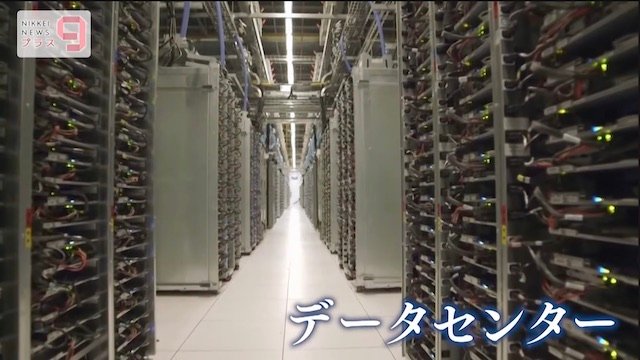TOKYOApril 24 (News On Japan) – Major US IT companies such as Microsoft and Oracle have announced substantial investments totaling 4 trillion yen ($26 billion) in data centers in Japan, raising concerns about digital sovereignty and AI development.
Initiatives such as ‘Digital Government’, promoted by the Japanese Digital Agency, are likely to play a role.
With Japanese companies also joining the fray, a future is expected in which data center power consumption exceeds current production. Will this development hinder the progress of AI in Japan?
Furthermore, under US cloud laws, criminal investigations even extend to US companies’ data centers in Japan, raising concerns about the protection of Japan’s data sovereignty.
Professor Ichiro Sato of the National Institute of Informatics, who provides a comprehensive perspective.
The facilities in the video are data centers for installing servers and networking equipment. Major American IT companies are quickly establishing these data centers in Japan. Oracle, Amazon Web Services and Microsoft, household names in Japan, are among the giant US IT companies that have announced plans to build data centers in Japan this year. The total investment amounts to a whopping four trillion yen.
Professor Sato, why are these American companies so intent on establishing data centers in Japan?
There are several reasons for this, but one of them is that these data centers are intended for cloud services. Currently, there is a movement in Japan to move the administrative systems of central government agencies and local governments to the cloud: a new trend. Since these are government systems, it is preferred to have them in Japan. Private companies feel the same way. Even if US clouds are used and the data centers are in Japan, Japanese law applies more broadly, so there is a growing demand to keep such facilities in Japan.
The chart here predicts the data center market size by country; America and China dominate, while Japan seems quite small in comparison. However, it is expected to be 1.4 times larger in 2028 than in 2023, reaching a market size of $24 billion or 3.7 trillion yen.
Professor Sato, do you think there is an oversupply of data centers in Japan, or how do you see demand?
Globally, data is expected to double every three years, increasing approximately 1.3 times annually. Not all of this data will be processed, but as data increases so does the need for computation, and much of this will be done in data centers, so the demand for data centers is expected to increase.
The government cloud was discussed earlier. How do data centers differ from clouds?
Clouds are realized via multiple data centers. American clouds in particular are automated, allowing one administrator to manage more than ten thousand servers, which is common. In Japan there is hardly a service that coordinates data centers, and Japanese data centers are more about companies installing and managing their own servers, so automation is minimal.
In this context, Japanese companies are also planning to build new data centers. Daiwa House plans a large-scale facility equipped with power supplies and racks. Sakura Internet can support government and local government cloud services and will eventually support generative AI. SoftBank plans to use data centers for its own AI development and cloud services.
With such moves by Japanese companies to build data centers, how do you view this?
For example, Daiwa House would literally be about offering companies a place to operate their servers. Sakura Internet manages its servers, but rents them to companies. SoftBank is likely focusing on its own use.
Each has its intended purpose, but the fact that American companies are building data centers in Japan indicates significant demand. Is it difficult for Japanese companies to meet this demand?
As Japan digitizes, the use of servers will increase, both via the cloud and through local data centers, increasing the demand for servers. This increase could lead to competition between Japanese data centers and data centers abroad. There’s a good chance this will happen, as owning servers or renting cloud services has significant cost implications that vary depending on usage. In general, using the same service obviously leads to competition.
So the situation is not as simple as universal welcome. While there are benefits to having data centers in Japan, challenges remain.
Source: BIZ



